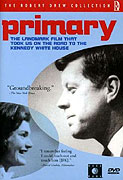Plots(1)
In 1960, former Life magazine correspondent Robert Drew changed the face of documentary filmmaking when he introduced the first of his powerful films about President John F. Kennedy. Utilizing a small portable camera and sync sound recorder for the first time ever, Drew and his team of cameramen--nascent documentarians Richard Leacock, Terrence McCartney Filgate, Albert Maysles, and D.A. Pennebaker--went on the road with the then-Senator from Massachusetts during the height of his 1960 Democratic primary run against Hubert Humphrey in Wisconsin. Unlike the directed and narrated documentaries of the day, Drew's uniquely mobile cameras moved with their subjects and captured the action as it unfolded, allowing for an unparalleled immediacy never before seen on film. The resulting documentary, PRIMARY, is considered one of the most groundbreaking moments in cinema history--not only for ushering in the the revolutionary movement known as cinema verité, but also for being an intimate portrait of both Kennedy and the American political experience. (official distributor synopsis)
(more)Reviews (1)
The significance of this work cannot be overestimated - it is the symbolic beginning of the so-called direct cinema approach enabled by advancements in film technology (light cameras, improved options for synchronizing and recording sound on location), and it still influences the concept of documentary filmmaking today. In conjunction with cinema-vérité (which, however, direct cinema should not be completely mistaken for, as anyone who has seen representatives from both movements knows), it brought about a revolutionary change in capturing reality that did not end in the 1960s but must still be fought for again and again. Therefore, even Primary is not just a piece of history today. The utopian and inspiring core of direct cinema lies in the following: the attempt to dissolve the camera and the documentarian in the observed object through pure observation; capturing a pure and unrestricted presentation of individuals/society externally; capturing unfolding reality through transparent observation, but doing so gently, like catching a butterfly, without any external interventions that disrupt the smooth flow of unreflected reality. The author of the documentary only appears on the scene in the editing process - the camera and editing as the creators of the film. Handshakes, fake smiles, endless car rides, rows of people waiting for rehearsed jokes - these are the truths of politics that only direct cinema was able to discover.
()
